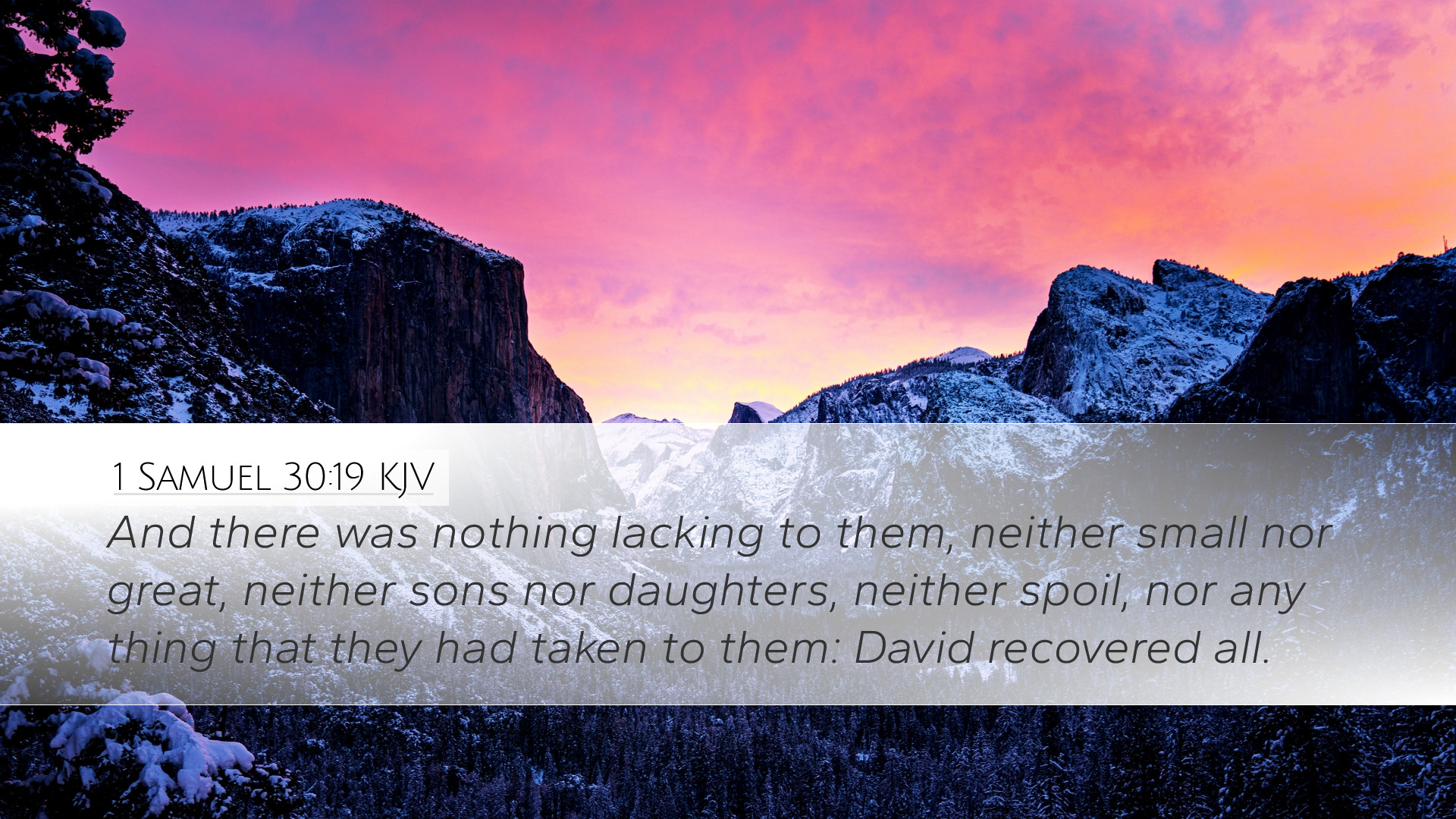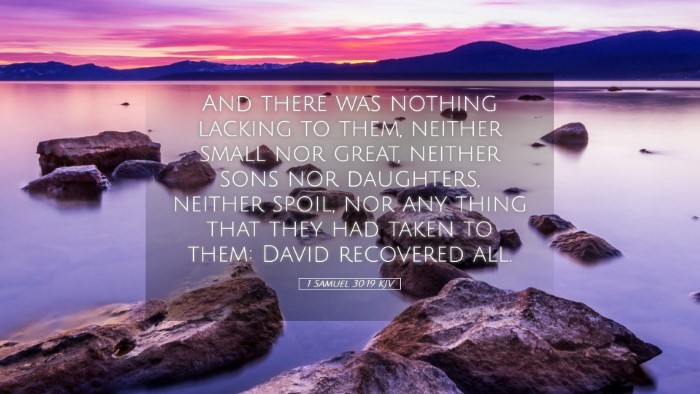Commentary on 1 Samuel 30:19
1 Samuel 30:19 states, "And there was nothing lacking to them, neither small nor great, neither sons nor daughters, neither spoil, nor any thing that they had taken to them: David recovered all." This verse encapsulates a significant moment in David's life, demonstrating the divine restoration and provision that God grants His people. The commentary below synthesizes insights from renowned public domain scholars such as Matthew Henry, Albert Barnes, and Adam Clarke.
Contextual Overview
This passage occurs after David and his men, returning to their home in Ziklag, discover it has been raided by the Amalekites. Their families have been taken captive, and their belongings plundered. David, deeply distressed yet resolute, seeks the Lord's guidance and subsequently pursues the attackers. The recovery of all that was taken illustrates God's faithfulness and sovereignty in David’s life.
Insights from Commentators
Matthew Henry's Commentary
Matthew Henry emphasizes the completeness of David's recovery, noting that "there was nothing lacking" indicates the thoroughness of God’s restoration. He highlights that this reflects God's covenant faithfulness. Henry points out that when David sought the Lord, he was granted success beyond his expectations:
- Faith in Action: David's inquiry of the Lord shows a model for believers: seeking divine guidance in times of distress.
- Divine Restoration: The restoration signifies not just the physical belongings but also the emotional and spiritual renewal that comes from God.
- Encouragement for Leaders: This passage serves to encourage leaders facing adversity, reminding them of the power of God to restore what has been lost.
Albert Barnes' Notes
Albert Barnes provides a detailed examination of the circumstances surrounding this event. He argues that the total recovery of David's possessions and family serves several critical lessons:
- God's Sovereign Intervention: Barnes points out that this moment showcases how God intervenes in history to preserve His plans and people.
- Importance of Leadership: The recovery is also attributed to David's leadership qualities and his ability to inspire and rally his men despite their earlier discouragement.
- Community Restoration: Barnes underscores that the restoration was not just personal but communal, as it involved the families of David's men, highlighting the societal impact of restoration.
Adam Clarke's Commentary
Adam Clarke delves into the linguistic aspects and cultural context of the verse, observing that the phrase "neither small nor great" underlines the totality of what was restored. Clarke's reflections include:
- Symbolism of Restoration: He notes that the restoration symbolizes God’s ability to restore lost spiritual vitality and purpose.
- Faithfulness of God: Clarke highlights the attribute of God as a faithful restorer, drawing parallels to Christian teachings on redemption and restoration in Jesus Christ.
- Encouragement in Despair: His commentary encourages believers to retain hope during trials, as God may bring restoration in unexpected ways.
Theological Implications
This verse not only reflects God’s restorative power but also illustrates fundamental themes in the biblical narrative of redemption. The following theological principles emerge from the study of this passage:
- God’s Sovereignty: The context reaffirms the belief that God governs all circumstances and that His purposes will prevail regardless of human setbacks.
- Restoration as a Theme: The theme of restoration is pervasive through Scripture, echoing in the journey of Israel and culminating in New Testament promises of restoration in Christ.
- Community & Leadership: The interplay between individual leadership and community recovery demonstrates how God uses leaders to foster hope and restoration among His people.
- The Role of Prayer: David’s act of seeking God before acting underscores the vital role of prayer and dependence on divine guidance in decision-making.
Conclusion
1 Samuel 30:19 serves as a profound reminder of God’s providence and restorative nature. The insights from various public domain commentaries invite reflection on God's faithfulness amidst trials and the importance of seeking His guidance in all circumstances. Pastors, scholars, and students are encouraged to draw from this passage for its rich implications for personal faith and communal life within the church.


